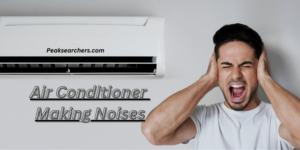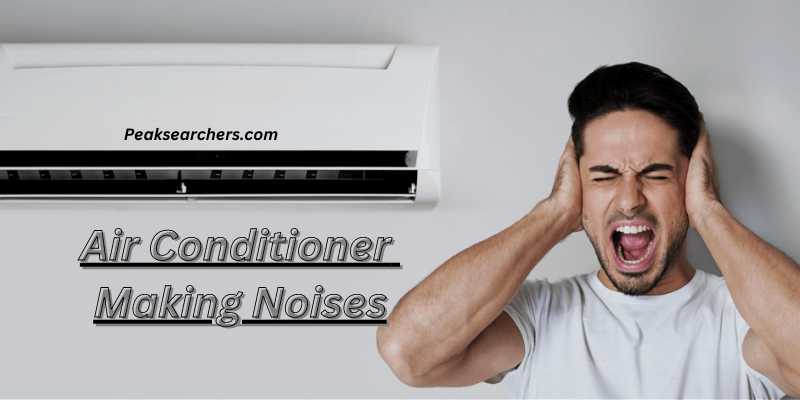Why Is My Air Conditioner Making Noises? A DIY Guide
Welcome to our comprehensive guide on troubleshooting the various noises that may arise from your air conditioner. At Peaksearchers, we understand the importance of a well-functioning air conditioning system for your comfort and peace of mind.
In this article, we will delve into the common reasons behind air conditioner noises and provide you with practical solutions to address them effectively.
In my case, I was not able to sleep in my room because of these sounds coming out of the Air conditioner. It was quite intimidating because I had never listened them before. Here’s what I did.

Understanding the Types of Noises
Air conditioners can produce different types of noises, each indicating a specific issue. By identifying the noise type, you can narrow down the potential problem and take appropriate action. Let’s explore the most common noises and their possible causes.
1. Rattling or Clanking Sounds
Rattling or clanking noises often signify loose or damaged components within your air conditioner. The following issues may be responsible:
- Loose screws or bolts
- Misaligned fan blades
- Debris in the unit
- Damaged motor or compressor mounts
2. Buzzing or Humming Sounds
Buzzing or humming sounds can arise from electrical components or moving parts. Possible causes include:
- Loose electrical connections
- Malfunctioning fan motor
- Faulty contactor relay switch
- Refrigerant leaks
3. Whistling or Hissing Sounds
Whistling or hissing sounds typically point toward airflow problems or leaks within the system. The following issues might be the culprit:
- Clogged air filters
- Leaky ductwork
- Refrigerant leaks
- Faulty expansion valve
4. Squealing or Screeching Sounds
Squealing or screeching noises are often related to problems with the fan motor or belt. Common causes include:
- Worn-out fan belt
- Faulty motor bearings
- Lack of lubrication
- Excessive fan blade vibration
Troubleshooting Noises in Your Air Conditioner
Now that we’ve identified the types of noises and their potential causes, let’s move on to troubleshooting the issues. Remember, if you are uncomfortable performing any of the following steps, it is always best to seek professional assistance.
1. Rattling or Clanking Noises
To address rattling or clanking sounds, follow these steps:
- Turn off your air conditioner and disconnect the power supply.
- Inspect the unit for loose screws, bolts, or fan blades. Tighten or adjust them as necessary.
- Remove any debris or obstructions from the unit, such as leaves or twigs.
- Check the motor and compressor mounts for damage. Replace if needed.
2. Buzzing or Humming Noises
To troubleshoot buzzing or humming sounds, consider the following steps:
- Switch off the air conditioner and disconnect the power.
- Examine the electrical connections, ensuring they are secure and tight. Tighten any loose connections.
- Inspect the fan motor for signs of damage or malfunction. Replace if necessary.
- Check the contactor relay switch for any faults. Replace if needed.
- If you suspect a refrigerant leak, contact a professional HVAC technician for assistance.
3. Whistling or Hissing Noises
To resolve whistling or hissing sounds, take the following measures:
- Turn off the air conditioner and disconnect the power.
- Check and clean the air filters regularly to ensure proper airflow.
- Inspect the ductwork for leaks. Seal any leaks using specialized duct sealant or contact a professional for repairs.
- If you suspect a refrigerant leak, contact a professional HVAC technician to handle it appropriately.
- Consider scheduling regular maintenance to prevent future airflow problems.
4. Squealing or Screeching Noises
To address squealing or screeching noises, follow these steps:
- Turn off the air conditioner and disconnect the power supply.
- Check the fan belt for wear and tear. If it appears worn or damaged, replace it with a new one following the manufacturer’s guidelines.
- Lubricate the motor bearings with a few drops of lubricating oil specifically designed for HVAC systems.
- Inspect the fan blades for any damage or imbalance. If necessary, balance the blades or replace them if they are beyond repair.
- If the noise persists or you are unsure of the cause, it is recommended to consult a professional technician to diagnose and resolve the issue.
Preventive Maintenance Tips
Regular maintenance can help prevent air conditioner noises and prolong the lifespan of your unit. Here are some essential tips to keep your air conditioner running smoothly:
- Clean or replace air filters: Clogged filters can restrict airflow and put a strain on the system, leading to potential noises. Clean or replace the filters every 1-3 months, depending on the manufacturer’s recommendations.
- Keep the outdoor unit clean: Regularly inspect the outdoor unit and remove any debris, such as leaves, grass, or branches, that may obstruct airflow and cause noise issues.
- Schedule professional maintenance: Consider scheduling annual maintenance with a qualified HVAC technician. They can inspect and tune up your air conditioner, ensuring optimal performance and identifying any potential issues before they escalate.
- Maintain proper clearance: Ensure that there is adequate clearance around the outdoor unit to allow for proper airflow. Trim any vegetation or obstructions near the unit to prevent restricted airflow and potential noise problems.
- Monitor refrigerant levels: Low refrigerant levels can cause hissing sounds. If you suspect a refrigerant leak or inadequate levels, contact a professional technician to inspect and recharge the system.
Also Read: What Size Generator To Run Air Conditioner? A Detailed Information
FAQ’s
How do I stop my air conditioner from making loud noises?
To stop your air conditioner from making loud noises:
- Identify the noise source.
- Check for loose components and tighten connections.
- Clean or replace air filters regularly.
- Clean the condenser coils to remove dirt and debris.
- Lubricate moving parts to reduce friction.
- Have a professional check for refrigerant leaks.
- Insulate ductwork to minimize noise transmission.
- Install sound-dampening materials around the unit or walls.
- Schedule regular maintenance with a professional.
- Seek professional assistance if the noise persists.
These steps will help you address the issue and create a quieter environment for your air conditioner
What does a bad AC compressor sound like?
A bad AC compressor can produce various sounds, indicating potential issues. Here are some common noises associated with a faulty AC compressor:
- Loud rattling or clanking: This noise often suggests loose or broken components within the compressor, such as piston pins or connecting rods.
- High-pitched squealing or grinding: A worn-out or damaged compressor may produce a shrill or grinding noise when it operates. This can be due to worn bearings or a misaligned clutch.
- Hissing or bubbling: If you hear a hissing or bubbling noise near the compressor, it could indicate a refrigerant leak. This should be addressed promptly as it affects the AC system’s performance.
- Clicking or tapping: Rapid clicking or tapping sounds might indicate an electrical issue within the compressor, such as a faulty relay or capacitor.
- Buzzing or humming: A buzzing or humming noise can result from various compressor problems, including electrical issues, loose components, or an overcharged refrigerant.
- Loud knocking: Intermittent or continuous knocking sounds can signify a serious problem, such as a damaged piston or compressor internals.
It’s important to note that diagnosing the specific issue requires professional expertise. If you suspect a problem with your AC compressor based on these sounds, it’s recommended to consult a qualified HVAC technician.
Why My Air conditioner makes whooshing noise?
If your air conditioner is making a whooshing noise, it could be due to a few possible reasons:
- Normal operation: In some cases, a mild whooshing sound may be considered normal. It could be the sound of air flowing through the vents or the AC system’s fans operating to circulate the air. However, if the noise is unusually loud or disruptive, it’s worth investigating further.
- Clogged air filter: A dirty or clogged air filter can restrict airflow, leading to increased pressure within the system. This can result in a whooshing or rushing sound as the air is forced through the filter. Try cleaning or replacing the air filter to see if it resolves the issue.
- Blocked or dirty vents: Obstructions in the air vents, such as debris or dust accumulation, can disrupt the smooth airflow and create a whooshing noise. Inspect and clean the vents to ensure unobstructed airflow.
- Damaged ductwork: Leaks, gaps, or loose sections in the ductwork can cause air to escape or create turbulence, resulting in a whooshing noise. Professional inspection and repair of the ductwork may be necessary to address this issue.
- Improperly sized ducts: If the ductwork is undersized or mismatched for your air conditioner, it can create air pressure imbalances, leading to whooshing sounds. A qualified HVAC technician can evaluate the duct system and recommend appropriate modifications if needed.
- Blower motor issues: A malfunctioning blower motor or its components can produce abnormal noises, including a whooshing sound. Have a professional inspect the blower motor and its associated parts for any defects or damage.
It’s important to note that diagnosing the exact cause of the whooshing noise requires a thorough examination by a qualified HVAC technician.
Split AC indoor unit making noise?
If your split AC indoor unit is making noise, there are a few potential causes to consider:
- Fan or motor issues: The indoor unit contains a fan and motor that circulates air throughout the room. Noises from the fan or motor could indicate loose or damaged components. Check for loose screws or debris and tighten or clean them accordingly. If the noise persists, it may require professional inspection and repair.
- Blower wheel problems: The blower wheel is responsible for drawing air into the unit. If it becomes unbalanced or dirty, it can create a noise. Cleaning the blower wheel or ensuring it is properly aligned might help. However, if the noise continues, it’s advisable to consult a professional technician.
- Loose parts: Vibrations from the AC unit can cause screws, panels, or other components to become loose over time. Carefully inspect the unit and tighten any loose parts. However, be cautious and avoid handling any electrical components if you’re unsure. Seek professional assistance if needed.
- Refrigerant issues: Low refrigerant levels or improper refrigerant flow can lead to gurgling or bubbling sounds. It’s recommended to have a professional HVAC technician assess the refrigerant levels and ensure the system is functioning properly.
- Ductwork problems: The noise could originate from the ductwork connected to the indoor unit. Damaged or poorly insulated ducts can create rattling or whooshing sounds. Inspect the ductwork for any visible issues and consider professional ductwork inspection if necessary.
- Expansion and contraction noises: Temperature changes during AC operation can cause materials to expand or contract, resulting in clicking or popping sounds. This is usually normal and not a cause for concern unless the noise is excessively loud or persistent.
Why is my window air conditioner making noise?
If your window air conditioner is making noise, there are several potential causes to consider:
- Loose or vibrating components: Check for any loose screws, panels, or other components within the unit. Tighten them carefully to eliminate vibrations that could be causing the noise.
- Fan issues: The fan in the air conditioner can sometimes become misaligned or clogged with debris, causing it to produce loud or rattling noises. Clean the fan blades and ensure they are properly aligned. If the noise persists, the fan motor may need professional inspection or replacement.
- Damaged fan blades: If the fan blades are bent, cracked, or damaged, they can create a scraping or grinding noise as they rotate. In such cases, the blades may need to be repaired or replaced.
- Compressor noise: The compressor is responsible for cooling the air, and it can produce various sounds during operation. However, if the noise is excessively loud, it may indicate a problem. It’s best to have a professional technician inspect the compressor for any issues.
- Electrical problems: Faulty electrical connections, worn-out wiring, or defective components can generate buzzing or humming noises. Contact a qualified technician to assess and resolve any electrical issues within the air conditioner.
- Loose or damaged window installation: If the air conditioner is not securely installed in the window frame, it may vibrate or rattle, leading to noise. Check the installation and make sure the unit is properly secured.
- General wear and tear: Over time, parts within the air conditioner may wear out, leading to increased noise levels. Regular maintenance and cleaning can help prevent or minimize these issues.
Conclusion
In this comprehensive guide, we have explored the various noises that can occur in air conditioners and provided troubleshooting steps to help you address each issue. Remember, it is crucial to address these noises promptly to prevent further damage and ensure your air conditioner operates efficiently.
By following the preventive maintenance tips and taking the necessary steps to resolve noise problems, you can maintain a quiet and comfortable environment in your home or office. However, if you encounter persistent or complex issues, it is always advisable to consult a professional HVAC technician for expert assistance.
Investing time and effort in properly maintaining your air conditioner will not only help eliminate noises but also extend the lifespan of your unit, saving you money in the long run. Enjoy the cool comfort of a well-functioning air conditioner without the distraction of unwanted noises!


